
I can just about remember looking at a copy of CVG in late 1998 (can't remember the exact date - but thats what drugs and alcohol tends to do to the fragile human mind after years of mild to heavy useage), and being enormously impressed with the lineup of games that were intended to be coming for the brand new Sega Dreamcast. Obviously, most of them arrived roughly a year later (at midnight on October 28th 1999, if my aforementioned and recently defragged memory serves me), and were for the most part excellent. BUT - and this is a fucking huge, Rick Waller sat on a Hippo-style
BUT - what about the games that we all saw in the lovely magazines but never fucking came out eh? I ain't talkin about Half-freakin-Life here, either peeps. That's old news I'm afraid.
I'm talking about the other stuff that would have made the DC an even better prospect than it already was -
and still is!Lets look at some of the titles were were promised, but never got. Just like when you asked your mum for a pair of Nike, Reebok or even Ascot trainers...and all you got were a pair of plastic soled Zee from the charity shop that had a SEAM that ran down the middle because they were MOULDED from the tears of lost children.
Anyway, enough about the traumatic childhood that will inevitably come back to haunt me and turn me into a serial killer. Let's get on with the show!
Castlevania ResurrectionOh, how I loved Castlevania: Symphony of the Night on the PlayStation. It proved to me that, contrary to popular belief, 2D games are not shite and do not belong on the MegaDrive were they came from. Furthermore, they do not steal the jobs of honest, hardworking 3D games - they just get up earlier and work harder to achieve more from life. Ahem.
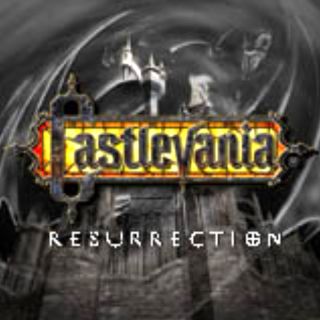
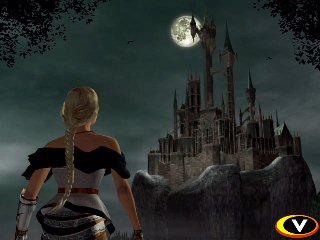

Castlevania Resurrection, not to be confused with a clinic for the impotent, was meant to be a true 3D update of the classic game and be set some years before the original adventure (1666, to be precise). You were to be able to play as one of two characters (Victor and, er, Sonia) and waft through Dracula's castle like a garlic flavoured fart, (re)killing any undead minions and generally raising hell (heaven?) until the final showdown with old Drac himself. It was never released, I belive, due to a fall out between different factions of Konami's internal dev team and also the waning popularity of the Dreamcast as a whole. The graphics look pretty decent (if a bit angular) and it looks about a million times better than Castlevania64 (which isn't really that difficult - Gauntlet on the NES looks (and sounds) better than Castlevania64). An intriguing title, but alas one we'll never see. More info? look
here.
OutcastAha! Now this looked amazing. The PC game was well recieved by the press and featured some amazing-for-the-era Voxel based graphics that meant the undulating terrain could stretch for miles into the distance. You played US Navy SEAL Cutter Slade in this 3rd Person action adventure, who was sent to a parrallel universe to help a group of scientists recover a probe sent there by the US government to prove the place existed (?!).
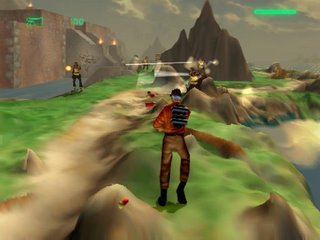


It was Slade's mission to sort the mess out and then get them all back home, Quantum Leap style (only without the help of Al, or indeed Ziggy). The PC game featured over 50 hours of gameplay, 1050 NPCs to engage in conversation and 6 large 'continents' to explore - each with it's own unique flavour (technologically advanced, primitive, warlike etc). A version was planned for the Dreamcast launch and the sytem could quite easily have handled the Voxel engine. Evidently, the game wasn't ready for the console launch and still wasn't ready by mid 2000. Eventually Outcast DC was cancelled, mainly because of the PC version's low sales and the poor sales performance of the console. Damned money-grabbing swines.
Scud RaceA name (to me anyway) synonymous with intense arcade racing and the ill-fated (I fucking hate that phrase, but it's the best one to use really. It's a bit like the word 'Reveller,' meaning 'party goer' - you never actually use it in conversation. Tsk), rumoured and never released Sega Saturn 64-bit add-on/booster cartridge.

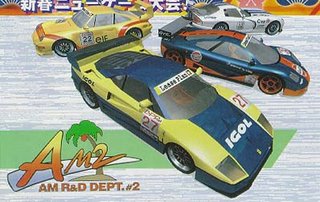

Scud Race was reportedly going to be one of the games to make use of the upgrade, along with Virtua Fighter 3. The upgrade rumour was dead in the water before long, the DC came along and apparently work was started on a conversion of Scud Race. Of course, it was never completed and was washed away by the ever-lapping tides of the Sea of Time, dragged under by the current and then deposited on the Beach of the Forgotten (aka Blackpool), never to be seen again.
Or so you thought.
Apparently, there is a half finished version of Dreamcast Scud Race floating about, but it's virtually impossible to find and only a few really grainy pics of it exist on the net. And now here!
Legacy of Kain: Soul Reaver 2Raziel, oh Raziel - where for art thou chin, Raziel? Yep, old scarf face's first adventure on the Dreamcast was an absolute stormer of a game. Amazing graphics, great game play, top drawer level design and more fun than there are superlatives in the English language. Soul Reaver is one of the best games on the Dreamcast, without a vampire's shadow of a doubt (is it reflections or shadows they don't have? Hmmm...). But there was intended to be a sequel, Soul Reaver 2, developed concurrently for the PS2 and the DC.



Early screens featured in EGM at the time showed that the two versions were practically identical and coming along well, and any Dreamcast owner would have been forgiven for rubbing their mud covered hands at the prospect of more soul devouring, zombie impaling, wall climbing action. But suddenly - gone! Yes, virtually overnight Eidos and Crystal Dynamics decided that the Dreamcast wasn't powerful enough to accomodate the 'complex' architecture featured in Nosgoth's further reaches, and prompty ceased development. And that's clearly because the PS2 is obviously so much more advanced than the Dreamcast, right? Exactly. I mean, look at those shots...
Is that the sound of a cash register I hear?
Daytona USA 2I know what your gonna say: "Daytona
was released on the Dreamcast, you complete
twat!"
Calm down, count to ten, put your pint of Smirnoff down and look at the title. It says Daytona USA
2. The version of everyone's favourite super-camp Nascar racer released on the Dreamcast was, for all intents and purposes, little more than a rehash. A Daytona Remix, if you will.


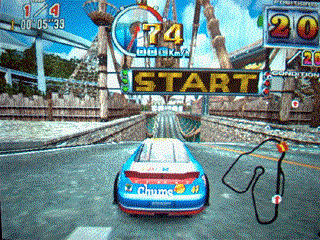
Yes, Daytona 2001 - awesome as it was - was just plain old Daytona CCE picked up, dusted off and given 3 new tracks and a few new secret cars. Daytona USA 2, on the otherhand was a full blown arcade sequel to Daytona USA and I have actually played it. Granted, my experience with Daytona 2 was in a motorway service station and I couldn't get full satisfaction out of the game because I was still reeling with disgust at the asking price of nearly £5 for a 3 day old cheese sandwich in the station shop. The graphics were mind blowing though and the tracks featured some really nice background details (I seem to remember a massive pirate ship for some reason) and top notch smoking tire effects when you skidded. Quite why Sega never brought Daytona 2 to the Dreamcast isn't clear, but it was featured in an issue of Games Master Magazine as an upcoming Dreamcast release. Go figure.
Colin McRae Rally 2.0The rally game to end all rally games - Colin McRae was one of the best games on the PSX and it's sequel threw in more of the same - wicked car handling, real-time vehicle damage, new gameplay modes and more tracks than the London Underground. A Dreamcast version of Colin McRae 2.0 was very much underway when it all went quite down at Codemasters HQ. Screens in the magazines showed a game that looked very similar to a high-end PC version and one that promised to be much more of a rally simulation than V-Rally 2: Expert Edition.



Much in the same way that Soul Reaver 2 was canned, McRae 2.0 simply vanished because Codemasters didn't think it would generate enough revenue to warrant a release. Judging by the screens that are availible, the Dreamcast version looks as though it was very close to completion - it's a massive shame it never saw the majesty of a sunrise on crisp winter morning. Sniff.
Here's a press release from Codemasters:
"Following careful consideration, including consultation with external parties, any further development on the Dreamcast version of Colin McRae Rally 2.0 and any future projects on the aforementioned platform has ceased. We continue to optimise resources by focusing teams on appropriate platforms."
The motherfucking cunts.Geist ForceOne of the very first games I ever saw running on Dreamcast Hardware, Geist Force was meant to be Sega's answer to Lylat Wars (that's StarFox 64 to the rest of the world) in that it appears to be a sort of 3D space based shoot 'em up.

Very, very little is known about Geist Force simply because it was cancelled before the Dreamcast even launched. One rumour I remember reading was that the game's designer and Sega's quality control department wasn't happy with how it was coming along and scrapped it, with the game 50-60% complete. Whatever the truth, one question remains - if Sega's quality control dept are so strict, how did Zombie Revenge get released?! If you'd like more info, click
here to view a video of Geist Force in action.
Max PayneDetective, nutter, family man and apparent expert in facial reconstruction (the Payne in
The Fall of Max Payne is an IMPOSTER!) - yep Det. Maxwell Payne was originally meant to take a one-way ticket to Dreamcastville to carry on the hunt for answers. Again, little is known about the DC version of this predominantly PC-centric shoot 'em up, but I'll wager it was gonna be a direct PC port. And who can say fairer than that? Max Payne is a classic shooter and would have been right at home on a console is pretty much just a slightly tweaked PC in a box.

Naturally, there are literally hundreds of games that were announced but never released but I feel that here The Dreamcast Junkyard has covered the main ones. Just for the hell of it and you want to do some more research, may I
a) suggest you get a fucking life; and
b) suggest you type any of the following into Goooooooooooogle, prefixed with the words 'dreamcast version of':
Black & White
World's Scariest Police Chases
Picasso
Shadowman: Second Coming
UFC Tapout
Right. It's sunny so I'm going out to drink Newcastle Brown - like a real fookin' man. Later.





















































